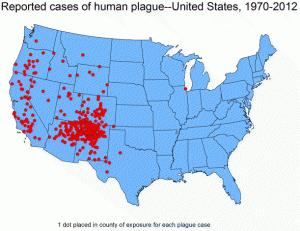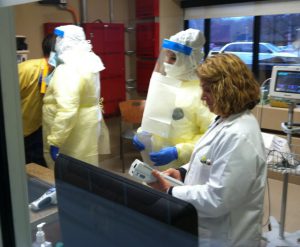Archive for June, 2017
A new cyberattack similar to WannaCry hits businesses, port operators and government systems in Asia, Europe, U.S. and South America.
Wednesday, June 28th, 20173 human plague cases from Santa Fe County, NM in 2017
Tuesday, June 27th, 2017
Additional Cases of Human Plague in Santa Fe County
Second and Third Cases Reported This Year
The New Mexico Department of Health (NMDOH) is reporting two recent confirmed plague cases in 52-year-old and 62-year-old females from Santa Fe County. With the addition of these cases, there have been three human plague cases from Santa Fe County in 2017. All three cases required hospitalization. There have been no deaths from plague in 2017.
NMDOH conducted environmental investigations around the homes of the patients to look for ongoing risk and to ensure the safety of the immediate family and neighbors.
Plague is a bacterial disease of rodents and is generally transmitted to humans through the bites of infected fleas, but can also be transmitted by direct contact with infected animals, including rodents, wildlife and pets. Plague can be present in fleas that infest wild rodents in Santa Fe County, including the city limits of Santa Fe, and several other New Mexico counties.
“Pets that are allowed to roam and hunt can bring infected fleas from dead rodents back into the home, putting you and your children at risk,” said Dr. Paul Ettestad, public health veterinarian for the Department of Health. “Keeping your pets at home or on a leash and using an appropriate flea control product is important to protect you and your family.”
To prevent plague, the Department of Health also recommends:
- Talk to your veterinarian about using an appropriate flea control product on your pets as not all products are safe for cats, dogs, or your children.
- Clean up areas near the house where rodents could live, such as woodpiles, brush piles, junk and abandoned vehicles.
- Sick pets should be examined promptly by a veterinarian.
- See your doctor about any unexplained illness involving a sudden and high fever.
- Put hay, wood, and compost piles as far as possible from your home.
- Don’t leave your pet’s food and water where mice can get to it.
Symptoms of plague in humans include sudden onset of fever, chills, headache, and weakness. In most cases there is a painful swelling of the lymph node in the groin, armpit or neck areas. Plague symptoms in cats and dogs are fever, lethargy and loss of appetite. There may be a swelling in the lymph node under the jaw. With prompt diagnosis and appropriate antibiotic treatment, the fatality rate in people and pets can be greatly reduced. Physicians who suspect plague should promptly report to the Department of Health.
In New Mexico, there were four human plague cases in 2016 in Bernalillo, Mora and Rio Arriba counties with no fatalities; and four human plague cases in 2015 in Bernalillo and Santa Fe counties with one fatality.
For more information on plague, including fact sheets in English and Spanish, visit the Plague section of our website.
Army lab may have lost small amount of sarin
Monday, June 26th, 2017“…..Dugway is the same facility that was the source of a nationwide scare in 2015 after it was reported the facility had inadvertently shipped hundreds of samples of live anthrax to medical labs in all 50 states and nine other countries when the samples were supposed to be inactive. ….”
Nine dead and 28 are missing after a boat carrying 150 people sank in Colombia on Sunday.
Monday, June 26th, 2017Chinese Landslide: 15 bodies recovered but more than 100 remain missing.
Sunday, June 25th, 2017At least 123 people who had gathered to collect fuel from an overturned tanker truck in Pakistan were killed and more than 100 were injured, many with severe burns, when it caught fire Sunday.
Sunday, June 25th, 2017Red Cross’ safe and dignified burial (SDB) activities in the three West African outbreak countries prevented from 1,411 to 10,452 secondary Ebola cases
Sunday, June 25th, 2017Tiffany A, Dalziel BD, Kagume Njenge H, Johnson G, Nugba Ballah R, James D, et al. (2017) Estimating the number of secondary Ebola cases resulting from an unsafe burial and risk factors for transmission during the West Africa Ebola epidemic. PLoS Negl Trop Dis 11(6): e0005491. https://doi.org/10.1371/journal.pntd.0005491
“……Red Cross safe and dignified burial (SDB) activities….may have reduced the epidemic by 4.9% to 36.5%…..”
Yemeni healthcare system: Children dying of cholera in hospital hallways. Four sick people crammed into one bed. Patients connected to intravenous drips while sitting in their cars because the hospital is over capacity.
Sunday, June 25th, 2017“…..The cholera outbreak has infected more than 200,000 people across Yemen, and it appears that 500,000 could eventually become sick. More than 1,300 people have already died…..”






